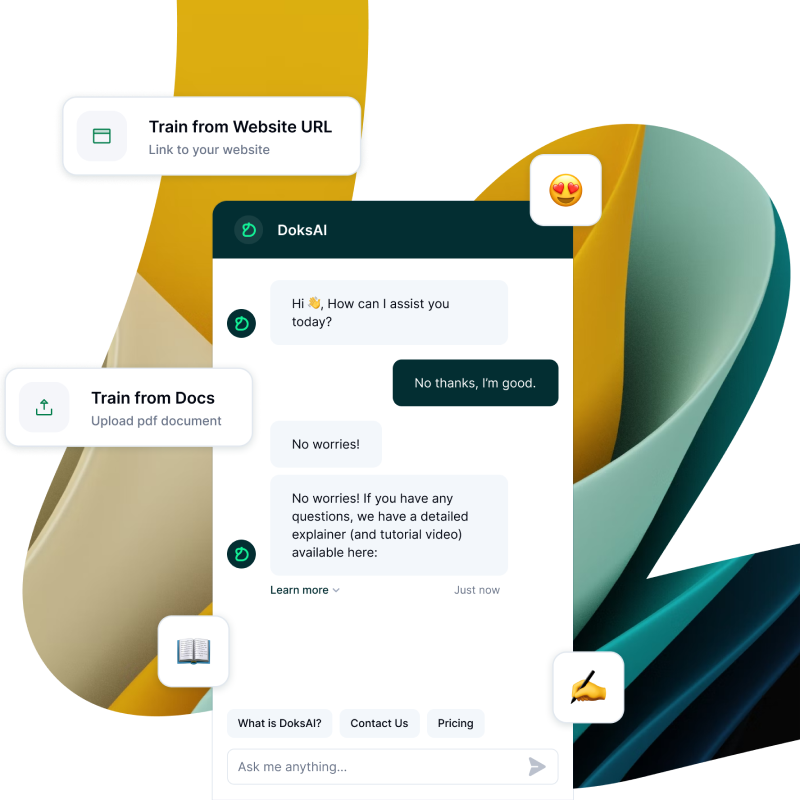With the ever-growing amount of information and resources available, it can be overwhelming and time-consuming to find accurate and relevant information.
This is where AI-powered search in the documentation and knowledge bases comes into play, making the process of finding information a breeze for developers. In this blog, we will explore how AI-powered search can help developers quickly and efficiently navigate through the ocean of information.
What are the limitations of Traditional Search?
One of the main drawbacks of traditional search is that it requires users to be very specific in their queries. For example, if a developer is looking for a solution to a particular issue, they need to know the exact keywords and phrases to use in order to get the right results. This can be difficult if the user does not have a good understanding of the technology or if the problem is complex. AI-powered search can help bridge this gap by recognizing natural language and providing more accurate results.
Before we dive into the benefits of AI-powered search, let's take a look at the limitations of traditional search methods:
Keyword Dependency: Traditional search engines rely heavily on keywords, which means that if you don't use the exact keyword or phrase, you might miss out on relevant results.
Difficulty Handling Ambiguity: Traditional search engines struggle with ambiguous queries, as they cannot differentiate between various meanings or contexts associated with a term. This leads to an array of unrelated results that developers must sort through in order to find pertinent information.
Inability to Understand Context: Traditional search engines often don't take into account the context of your search query, resulting in irrelevant or less useful results.
Static Ranking Algorithms: Most traditional search engines use static ranking algorithms that focus on factors like keyword density. This approach fails to consider the relevance and usefulness of the content, leading developers to manually sift through numerous results before finding what they need.
Power of AI in Search
AI-powered search engines have the potential to overcome the limitations of traditional search methods. By leveraging machine learning and natural language processing (NLP) techniques, AI-powered search engines can provide developers with more accurate, relevant, and personalized search results.
Understanding Natural Language Queries
One of the main advantages of AI-powered search engines is their ability to understand natural language queries. Instead of relying on specific keywords, AI search engines can analyze the context and intent of your query, providing results that are more closely related to what you are looking for.
Semantic Search
Semantic search is another key feature of AI-powered search engines. Instead of just matching keywords, semantic search considers the meaning and relationships between words, providing more accurate and relevant results. This allows developers to find information even if they don't use the exact terminology used in the documentation or knowledge base.
Personalized Search Results
AI-powered search engines can also provide personalized search results based on the user's preferences, search history, and other factors. This means that the search results will be tailored to the individual developer, making it easier to find the right information quickly.
Practical Applications of AI-Powered Search for Developers
Now that we have a better understanding of the capabilities of AI-powered search, let's explore some practical applications for developers:
Efficiently navigating documentation: Developers can save time by using AI-powered search to quickly find relevant information within extensive documentation, without having to browse through multiple pages or sections.
Faster Problem Solving: AI-powered search engines can quickly provide developers with accurate and relevant information, reducing the time spent searching for solutions to coding problems.
Improved Learning Experience: AI-powered search engines can help developers learn new technologies and programming languages more efficiently by providing them with personalized and context-aware search results.
Streamlined Collaboration: AI-powered search can improve collaboration among developers by making it easier to find and share information within a team or organization.
Impact of AI-Powered Search on Developer Productivity and Project Timelines
Enhancing Developer Productivity
AI-powered search engines have a significant impact on developer productivity by reducing the time spent searching for information and providing more relevant results. Developers can now focus on writing code and solving problems rather than spending hours sifting through countless resources. The personalized search results catered to each developer's needs further streamline the process, making it easier to find the right solution quickly.
Accelerating Project Timelines
The efficiency gained from using AI-powered search engines not only benefits individual developers but also has a positive effect on project timelines. By minimizing time spent searching for solutions, developers can allocate more time to actual development tasks, leading to faster project completion. Additionally, improved collaboration due to easy access to shared knowledge helps teams work together more effectively, further accelerating the development process.
Overall, the introduction of AI-powered search in the documentation and knowledge bases contributes significantly to increased developer productivity and shortened project timelines, resulting in more successful projects and satisfied clients.
How to implement ChatGPT Powered Search in your Docs & Knowledge Base
To implement AI-powered search, it is important to choose the right tool like Doks.ai. Doks.ai is a powerful AI-powered search engine that leverages natural language processing (NLP) and machine learning techniques to provide developers with more accurate, relevant, and personalized search results. By understanding the context and intent of the query, Doks.ai can quickly provide developers with the information they need, eliminating the need to manually sift through multiple sources. With Doks.ai, developers can save time and increase their productivity while accelerating project timelines.
Step 1: Integrate Doks.ai with your Knowledge Base System
Doks.ai can be easily integrated into your existing knowledge base system, enhancing its functionality and making it more user-friendly. By incorporating Doks.ai's intelligent capabilities, your users can quickly find the information they need without sifting through countless documents or relying on manual searches.
Step 2: Train from multiple URLs
Expand your AI's knowledge by training it across multiple URLs or sources of information. This enables Doks.ai to have a broader understanding of different topics relevant to your organization and provide even more accurate answers when searching through documents or knowledge bases.
Step 3: Embed the Doks.ai widget
Once you have integrated and trained Doks.ai with your knowledge base system, the next step is to embed the Doks.ai widget into your website or application. This can be done easily via React or Web Components, allowing developers to quickly access the AI-powered search engine within their own docs. With the widget, developers can take advantage of Doks.ai's intelligent capabilities to find the information they need without having to leave the application.
Step 4: Optimize your AI's response
Doks.ai's advanced AI capabilities can be further optimized to suit your organization's needs. You can customize the language model and the response system to ensure that your users get the most accurate and relevant results. With custom settings, you can also ensure that your AI responds in a way that best fits your brand's voice and personality.
Step 5: Track usage, and get feedback
To ensure that your AI-powered search engine is providing the best results for your users, it is important to track usage and get feedback from them. This can be done by using the advanced Doks.ai metrics to measure how often users are finding relevant results and how satisfied they are with the answers they receive. Additionally, you can collect feedback from users to gain insight into their experience and make improvements to the system accordingly. By regularly monitoring usage and collecting feedback, you can ensure that your AI-powered search engine is providing the best experience for your users.
With the help of Doks.ai, you can take your document and knowledge base management to the next level.
Conclusion
In conclusion, AI-powered search engines like Doks.ai are transforming the way developers navigate documentation and knowledge bases. By leveraging machine learning and natural language processing, these intelligent search engines provide more accurate, relevant, and personalized results that significantly enhance developer productivity. The ability to understand natural language queries, perform semantic searches, and offer personalized results makes AI-powered search a crucial tool for developers in their quest for efficiency and collaboration. By integrating AI-powered search into your existing documentation and knowledge base systems, you can empower your developers to work more effectively, ultimately leading to faster project completion and greater overall success.



